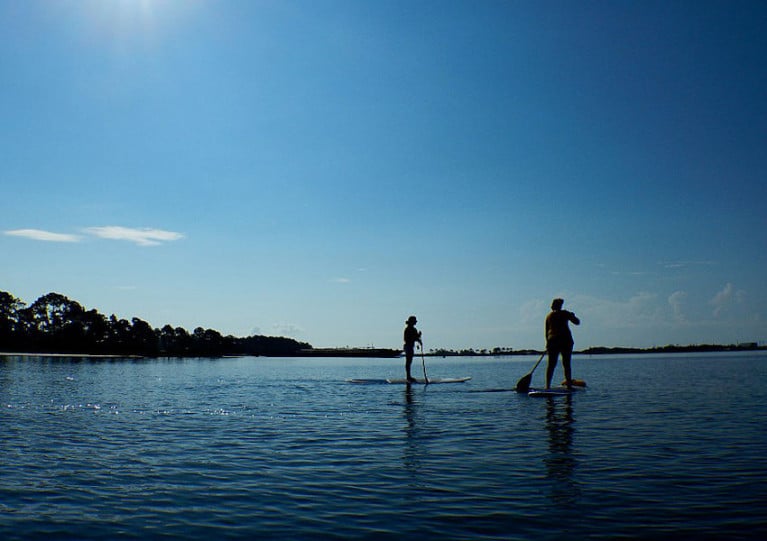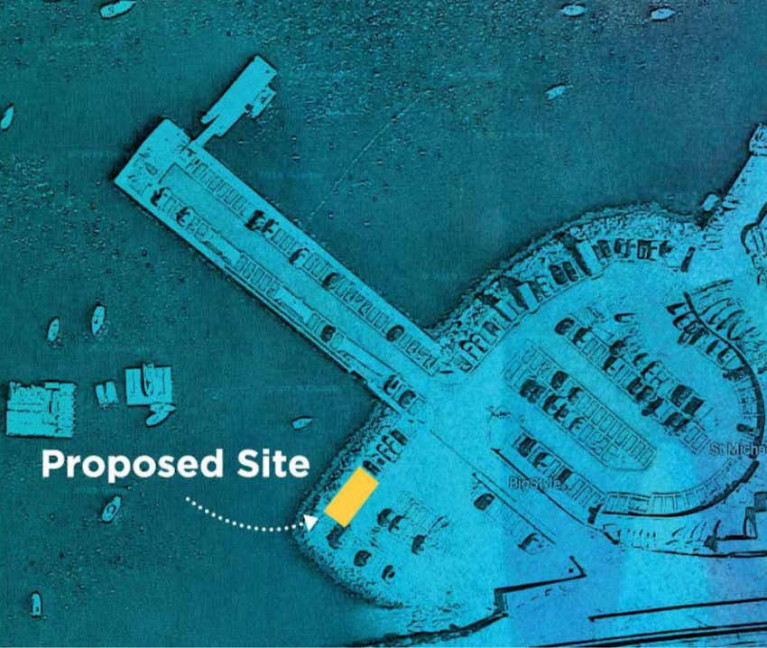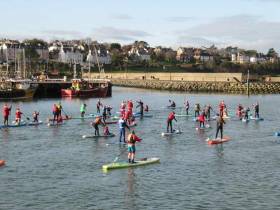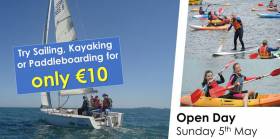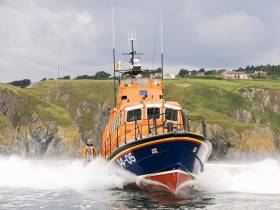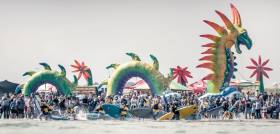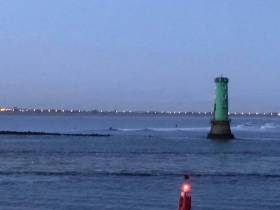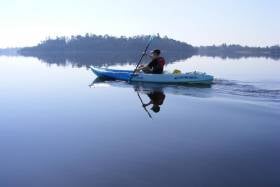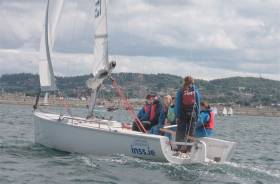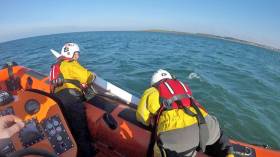Displaying items by tag: SUP
Stand-Up Paddleboarding Is All The Rage As Lockdown Eases
ITV Meridian reports on the rise of stand-up paddleboarding, or SUP, in the south of England as lockdown restrictions ease.
Record sales have been reported by paddleboard stockists as more and more people take up the relatively sedate watersport, which can be enjoyed on inland waterways while easily maintaining social distancing.
John Hibbard, chief executive of SUP brand Red Paddle, said: “Participation in paddleboarding has been rapidly growing over the past few years but with incredibly hot weather, gyms still closed, lockdown lifting but with social distance still required, paddleboarding has just taken off.”
Watersports training centres throughout the south and south-east of England have also experienced a surge in bookings for people of all ages eager to level up their SUP skills.
ITV Meridian has more on the story HERE.
Watersport School To Open New Hub At Dun Laoghaire’s Coal Harbour
Irish watersport school BigStyle has announced the development of a new hub for stand-up paddleboarding at Dun Laoghaire’s Coal Harbour.
The news comes just months after the business, which has expanded as far afield as East Africa, mooted plans for a more permanent base in Dun Laoghaire, where one of its founders grew up.
The new facility will be constructed from renovated shipping containers, in a similar fashion to the Irish Sailing Performance HQ opened in the harbour last year.
BigStyle says its new space will comprise ‘chill-out areas’, changing rooms, clothes and equipment storage, direct access to the water “and a whole lot of charm”, along the lines of its own Atlantic Lodge for the surfing community in Co Mayo.
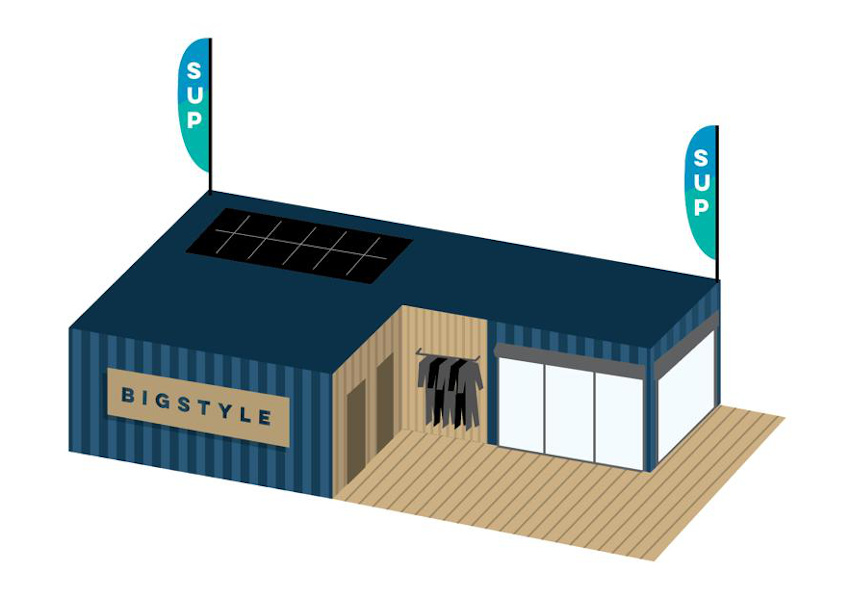
“Above all we want to be as environmentally conscious as possible — the building will be totally off grid with solar panels, a water harvester, 12v power and as little single use plastic as possible,” the business says.
While the main purpose of the space will be the SUP school, BigStyle also plans to have a surf shop and a simple coffee shop, and will also make room for the Clean Coasts initiative to spread awareness, launch clean-ups and hold various events.
The space is currently scheduled to open just over three months from now, at the beginning of May, “and we’re confident that this will help reinvigorate an often overlooked area of the harbour”, the company adds.
Stand Up Paddleboarding Fundraiser at Bangor Harbour
It’s not often a Notice to Mariners is issued by Bangor Harbour on Belfast Lough for a paddleboarding event but this was the case when a fundraiser was held in the Harbour on a very cold Sunday morning (1st Dec) writes Betty Armstrong
Stand Up Paddleboarding has taken off in Northern Ireland and a great turn out of SUPpers took part to support SUPforCancer. There were 38 adults, 12 children and three dogs. A substantial crowd watched from the Eisenhower Pier. It was organised by SUP Hub NI.
The event was sponsored by nine local business and plenty of prizes were won in what is believed to be the first-ever SUP Tombola where numbered tennis balls were scattered around the Harbour and paddlers had to race to scoop one up before a fellow paddler did. Their number correlated to a prize donated by one of the supporting businesses, a new and fun way for people to win prizes. There were special prizes for the Fastest Santa, Fastest ‘grim’ (kid), and best dressed.
In all £723 has been raised so far but the JustGiving link remains open in case readers wish to add to it here
Try Sailing And More At INSS Open Day This Sunday
The Irish National Sailing & Powerboat School is hosting its annual Open Day this Sunday 5 May with opportunities to try sailing, kayaking or paddleboarding for only €10.
Children aged 7 and up and their families can get to grips with the INSS’ fleet of 1720 Sportboats, as well as easy-to-master sit-on-yop kayaks and popular stand-up paddleboards, guided by the school’s experienced instructors.
Waterproof overalls and lifejackets will be provided for sailors, wetsuits and buoyancy aids for kayakers and paddleboarders, and hot showers will be provided after your fun on the water — so all you need to bring is your enthusiasm!
Three times slots are available on the day (10am-12pm, 12.30pm-2.30pm and 3pm-5pm) and booking must be made in advance. For more details see the INSS website HERE.
Dun Laoghaire & Wicklow Lifeboats Launch To Paddle Boarder In Distress
#Lifeboats - Dun Laoghaire RNLI responded to a stand-up paddle boarder who got into difficulty between Bray Head and Greystones yesterday afternoon (Sunday 27 January).
The volunteer lifeboat crew were requested to launch their all-weather lifeboat at 12.03pm and were on the water at 12.20pm.
The Irish Coast Guard helicopter Rescue 116 and Wicklow RNLI’s all-weather lifeboat were also tasked to the incident south of Bray Head.
Weather conditions were not good, with strong gale-force winds.
Dun Laoghaire’s crew of seven spotted the casualty who was clinging to his board and appeared in trouble.
Thirty-nine minutes after launch, the crew had the casualty onboard their lifeboat and quickly assessed he was suffering from “serious hypothermia”.
The casualty was airlifted to hospital by the coastguard. Wicklow RNLI recovered the paddle board and stood by as the casualty was winched onto the helicopter.
Commenting after the callout, Dun Laoghaire RNLI second coxswain Eamon O’Leary said: “The paddle boarder had suffered serious hypothermia when we arrived on the scene.
“It was a close call but he did the right thing in calling the coastguard who were quick to send out 116 along with Wicklow RNLI. It was fantastic teamwork by all involved.”
Dollymount Ready For Battle For The Bay This Weekend
#Kitesurfing - Fun, wind, water and fun are promised at this weekend’s Battle for the Bay kitesurfing and SUP competition on Dollymount Strand.
The best riders in the country and from around the globe will converge on Bull Island on Saturday 26 and Sunday 27 May to compete in the first leg of the IKSA tour at what organisers say is one of the best kitesurfing spots in the world.
All ages are welcome to cheer on the competitors, whether taking flight by kite or standing tall on their paddle boards.
Instructors will also be on hand to show you the ropes, while the food village, funfair and biodiversity area means there’s much more than the action on the waters of Dublin Bay.
For more see BattleForTheBay.com.
Dun Laoghaire Coast Guard In Callout To Paddle Boarders At Bull Wall
#Coastguard - The Irish Coast Guard received a call from a member of the public yesterday evening (Sunday 5 November) who advised that two stand-up paddle boarders appeared to be in difficultly at the North Bull Wall near Dublin Port.
Dun Laoghaire Coast Guard’s team was on patrol off Sandymount at the time and were tasked to investigate, first making contact with the concerned caller.
Due to fading daylight, it was difficult to assess the SUPs’ situation and the coastguard crew had to relocate to a better position.
Assistance was also requested by incoming ferries to investigate on their passage into Dublin Port if the SUPs were indeed in difficultly.
It was quickly determined that the SUPs were riding the wake from the ferries, and eventually returned to shore once the ferries had passed.
The paddlers were part of a group that travels out daily to meet the ferries, taking off from the north side of the North Wall and staying outside of the shipping channel. All have undergone safety training and have been an asset to emergency responders at times, said Dun Laoghaire Coast Guard.
However, to some out walking in the evening, they might appear to be making no progress and this may prompt concern.
“Thankfully a safe ending to a cold evening,” said the coastguard unit.
#Sailability - Fermanagh and Omagh District Council, in partnership with Waterways Ireland, has organised an eight-week paddle sport programme commencing next Friday 4 August.
The free programme will enable young people with a disability aged eight to 16 to receive expert coaching in a range of paddle sports such as canoeing and stand-up paddleboarding. All necessary equipment will be provided.
Sessions from Friday 4 to Friday 25 August will take place in the Fermanagh Lakeland Forum’s swimming and commence at 8.30pm, while sessions from Saturday 2 to Saturday 23 September will commence at 1.30pm and be delivered on the open water at Castle Island in Enniskillen. Each session will last for 60 minutes.
Speaking about the programme, chair of Fermanagh and Omagh District Council, Councillor Stephen McCann, said: “The council is committed to creating more opportunities for our residents to get active so that they can enjoy the benefits of leading an active lifestyle.
“The paddle sport programme will provide water activity enthusiasts an opportunity to try different paddle sport activities through coaching and instruction from qualified coaches.”
Waterways Ireland chief executive Dawn Livingstone also spoke of her delight at partnering with Fermanagh and Omagh District Council to deliver a programme offering on the waterways activities for young people living with a disability.
“Waterways Ireland is actively growing the numbers of people enjoying sustained recreational opportunities to engage in water-based activity,” she said. “It is hoped that through the 8 week programme, young people will discover their favourite activity, something they continue to enjoy through life.”
Participation on the programme is free of charge, however places are limited and allocated on a first come, first served basis. Participants must be accompanied by a parent, guardian or carer for the duration of each session.
To register or for further information, visit Fermanagh and Omagh District Council’s website or contact Chris Elliott at +44 300 303 1777 or [email protected].
#TrySailing - Sunday 14 May is the date for the Irish National Sailing & Powerboat School’s 2017 Open Day — where anyone can try sailing, kayaking or paddleboarding at Dun Laoghaire Harbour for only €10.
All ages are welcome on the day, whether families, friends or individuals, for what promises to be an exciting day on the water — coinciding with the annual Sail-a-thon charity event organised by sailors attending the INSS junior club sailing programme.
Whether you’re entirely new to the sport or rekindling an old flame, you’ll be learning how to sail on board one of the school’s fleet of 1720 sportsyachts — waterproof overalls and lifejackets provided!
Those interested in kayaking and paddleboarding, meanwhile, will be guided around the sheltered waters inside Dun Laoghaire Harbour to give a taste of what makes these activities so appealing.
Details on booking a session for the day can be found on the INSS website HERE.
#RNLI - At the end of a busy week for Bangor RNLI, the Belfast Lough volunteer crew launched to the rescue of two young paddleboarders who had got into difficulty just outside Ballyholme Bay yesterday (Saturday 8 April).
Launching just after 5pm following a call from the public, the Bangor lifeboat Jessie Hillyard launched to aid two girls who had been caught out by an offshore wind that was causing them to drift further out to sea.
Although it was a beautiful afternoon weather-wise, the girls hadn’t factored in the offshore wind, and this led to them getting more tired as they tried to return to base at Ballyholme Yacht Club.
The Bangor lifeboat, helmed by Peter Semple, made light work of picking up the girls and their boards and returning them to the slipway at the yacht club, where they were passed into the care of HM Coastguard.
After the rescue, Semple said: “We are delighted to have been able to return the two girls to safety. On arrival at the scene we were pleased to see that they were both wearing wetsuits and buoyancy aids, and had just misjudged the offshore wind.”


























